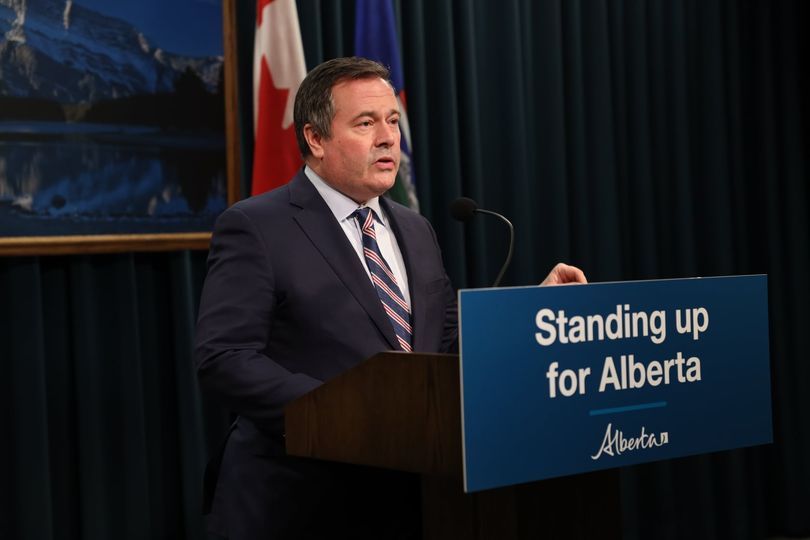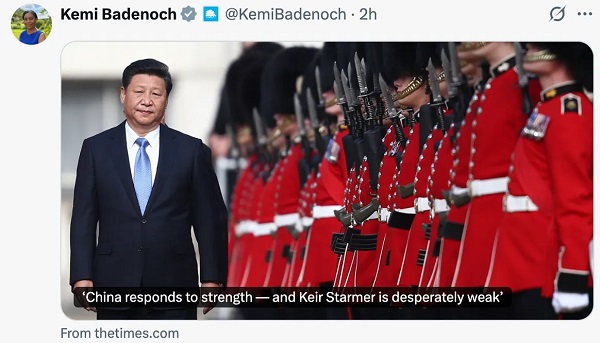Alberta
Premier Kenney demands PM Trudeau retaliate against President Biden in defence of Keystone XL

January 19
January 20
January 21
From January 20
Alberta
Busting five myths about the Alberta oil sands

Construction of an oil sands SAGD production well pad in northern Alberta. Photo supplied to the Canadian Energy Centre
From the Canadian Energy Centre
The facts about one of Canada’s biggest industries
Alberta’s oil sands sector is one of Canada’s most important industries — and also one of its most misunderstood.
Here are five common myths, and the facts behind them.
Myth: Oil sands emissions are unchecked

Steam generators at a SAGD oil sands production site in northern Alberta. Photo courtesy Cenovus Energy
Reality: Oil sands emissions are strictly regulated and monitored. Producers are making improvements through innovation and efficiency.
The sector’s average emissions per barrel – already on par with the average oil consumed in the United States, according to S&P Global – continue to go down.
The province reports that oil sands emissions per barrel declined by 26 per cent per barrel from 2012 to 2023. At the same time, production increased by 96 per cent.
Analysts with S&P Global call this a “structural change” for the industry where production growth is beginning to rise faster than emissions growth.
The firm continues to anticipate a decrease in total oil sands emissions within the next few years.
The Pathways Alliance — companies representing about 95 per cent of oil sands activity — aims to significantly cut emissions from production through a major carbon capture and storage (CCS) project and other innovations.
Myth: There is no demand for oil sands production

Expanded export capacity at the Trans Mountain Westridge Terminal. Photo courtesy Trans Mountain Corporation
Reality: Demand for Canadian oil – which primarily comes from the oil sands – is strong and rising.
Today, America imports more than 80 per cent more oil from Canada than it did in 2010, according to the U.S. Energy Information Administration (EIA).
New global customers also now have access to Canadian oil thanks to the opening of the Trans Mountain pipeline expansion in 2024.
Exports to countries outside the U.S. increased by 180 per cent since the project went into service, reaching a record 525,000 barrels per day in July 2025, according to the Canada Energy Regulator.
The world’s appetite for oil keeps growing — and it’s not stopping anytime soon.
According to the latest EIA projections, the world will consume about 120 million barrels per day of oil and petroleum liquids in 2050, up from about 104 million barrels per day today.
Myth: Oil sands projects cost too much
Reality: Operating oil sands projects deliver some of the lowest-cost oil in North America, according to Enverus Intelligence Research.
Unlike U.S. shale plays, oil sands production is a long-life, low-decline “manufacturing” process without the treadmill of ongoing investment in new drilling, according to BMO Capital Markets.
Vast oil sands reserves support mining projects with no drilling, and the standard SAGD drilling method involves about 60 per cent fewer wells than the average shale play, BMO says.
After initial investment, Enverus says oil sands projects typically break even at less than US$50 per barrel WTI.
Myth: Indigenous communities don’t support the oil sands

Chief Greg Desjarlais of Frog Lake First Nation signs an agreement in September 2022 whereby 23 First Nations and Métis communities in Alberta acquired an 11.57 per cent ownership interest in seven Enbridge-operated oil sands pipelines for approximately $1 billion. Photo courtesy Enbridge
Reality: Indigenous communities play an important role in the oil sands sector through community agreements, business contracts and, increasingly, project equity ownership.
Oil sands producers spent an average of $1.8 billion per year with 180 Indigenous-affiliated vendors between 2021 and 2023, according to the Canadian Association of Petroleum Producers.
Indigenous communities are now owners of key projects that support the oil sands, including Suncor Energy’s East Tank Farm (49 per cent owned by two communities); the Northern Courier pipeline system (14 per cent owned by eight communities); and the Athabasca Trunkline, seven operating Enbridge oil sands pipelines (~12 per cent owned by 23 communities).
These partnerships strengthen Indigenous communities with long-term revenue, helping build economic reconciliation.
Myth: Oil sands development only benefits people in Alberta
Reality: Oil sands development benefits Canadians across the country through reliable energy supply, jobs, taxes and government revenues that help pay for services like roads, schools and hospitals.
The sector has contributed approximately $1 trillion to the Canadian economy over the past 25 years, according to analysis by the Macdonald-Laurier Institute (MLI).
That reflects total direct spending — including capital investment, operating costs, taxes and royalties — not profits or dividends for shareholders.
More than 2,300 companies outside of Alberta have had direct business with the oilsands, including over 1,300 in Ontario and almost 600 in Quebec, MLI said.
Energy products are by far Canada’s largest export, representing $196 billion, or about one-quarter of Canada’s total trade in 2024, according to Statistics Canada.
Led by the oil sands, Canada’s energy sector directly or indirectly employs more than 445,000 people across the country, according to Natural Resources Canada.
Alberta
Click here to help choose Alberta’s new licence plate design

Your province, your plate
For the first time in more than 40 years, Alberta is refreshing its licence plate with a Strong and Free motto, and the final look will be decided by Albertans.
From Oct. 15 until Nov. 5, Albertans can take part in a tournament-style online vote for a new provincial licence plate design that proudly reflects who we are every time we hit the road.
The new licence plate will be available in late 2026 and will be based on a “Strong and Free” theme, echoing the Latin motto of our province and reflecting Alberta’s bold identity, economic strength and deep-rooted provincial pride. The motto’s inclusion on the licence plates will also serve as a nod to Canada’s national anthem and Alberta’s position as a strong and sovereign province within a united Canada.
“From our wide-open landscapes to our entrepreneurial spirit, Alberta has so much to be proud of, and our new licence plate will reflect that pride. For the first time in four decades, Albertans will choose how we tell that story. I look forward to seeing which design is selected to show the world that this is the land of the strong and free.”
With options that include famous Alberta landmarks such as the Three Sisters Mountains, and long-standing symbols of our province’s core industries including agriculture and energy production, the potential plates each contain symbols of Alberta’s beauty, history and spirit.
In the first phase of voting, Albertans can vote for their favourite of eight unique concepts that incorporate Alberta’s unique landscape and history. Following the first phase, four designs will advance to the next round of voting where the top two will be selected, and subsequently, there will be a final vote for the winning plate concept. The winning new licence plate will be announced during the fall session of the legislature.
“Alberta is strong and free, and Albertans will have the opportunity to choose a new licence plate that captures that spirit. The new licence plate will be a fresh design that every Albertan will be proud to show off, whether they’re driving to work, heading to the lake or exploring North America.”
If an Albertan wants to replace their current plate for the new licence plate once it is released, they can voluntarily pay a $28 fee. Alternatively, Albertans could obtain a new plate on their vehicle registration renewal date at no additional cost. Motorists may also continue using the previous licence plate once the new licence plate is brought onboard, provided it is still in good condition.
Quick facts
- Alberta’s current licence plate was designed in 1984.
- In 2021, Alberta began a transition from painted to reflective plates with the same design.
- The new designs each incorporate reflective technology to improve readability for law enforcement and automated systems in low-light conditions, and also meet international standards for visibility, legibility and counterfeit resistance.
Related information
Licence plate designs. Click link above to vote
-

 Alberta2 days ago
Alberta2 days agoClick here to help choose Alberta’s new licence plate design
-

 National2 days ago
National2 days agoDemocracy Watch Renews Push for Independent Prosecutor in SNC-Lavalin Case
-

 Business2 days ago
Business2 days agoOver two thirds of Canadians say Ottawa should reduce size of federal bureaucracy
-

 Media2 days ago
Media2 days agoCanada’s top Parliamentary reporters easily manipulated by the PMO’s “anonymous sources”
-

 espionage2 days ago
espionage2 days ago“Suitcase of Cash” and Secret Meeting Deepen Britain’s Beijing Espionage Crisis
-

 Alberta1 day ago
Alberta1 day agoBusting five myths about the Alberta oil sands
-

 Frontier Centre for Public Policy1 day ago
Frontier Centre for Public Policy1 day agoOttawa Should Think Twice Before Taxing Churches
-

 City of Red Deer1 day ago
City of Red Deer1 day agoPlan Ahead: Voting May Take a Little Longer This Election Day






